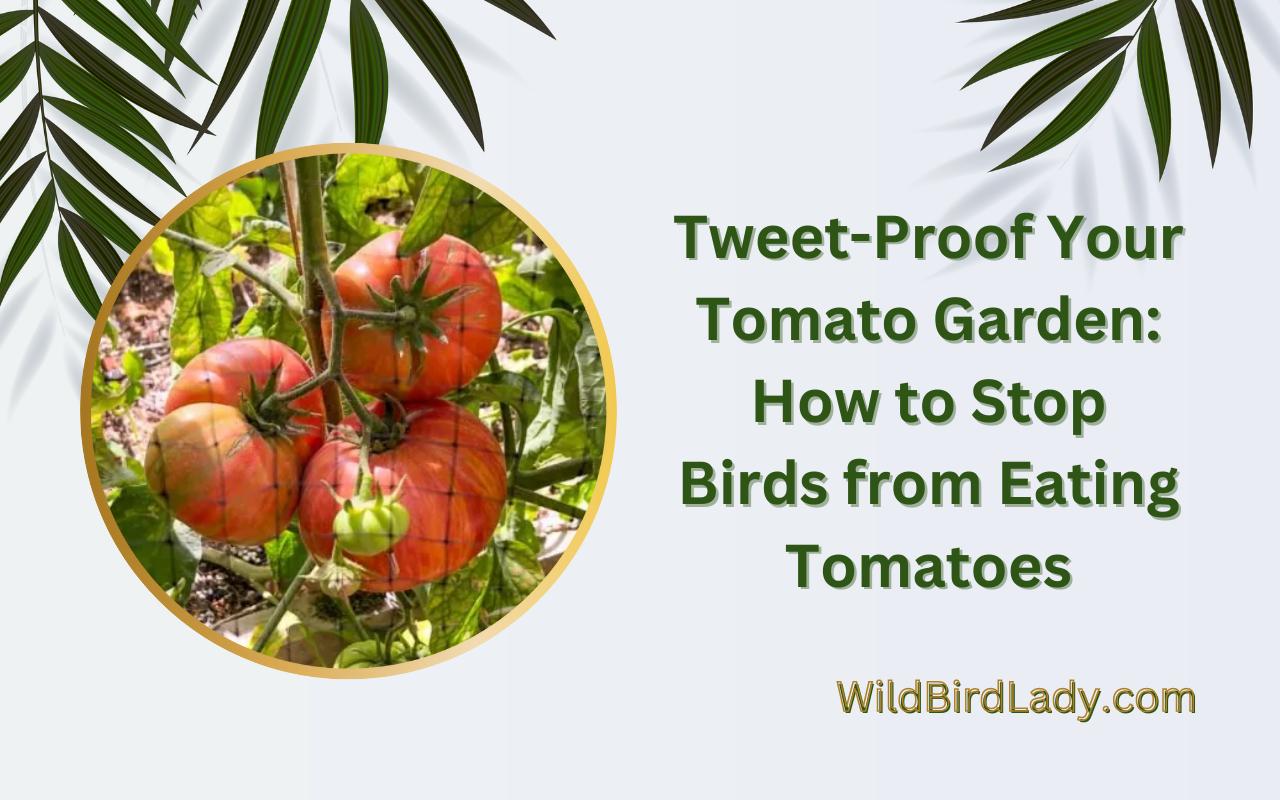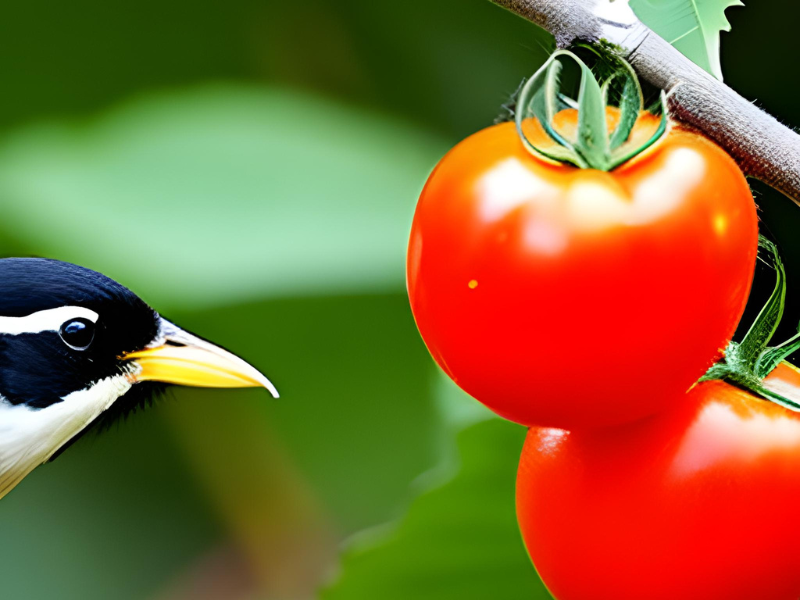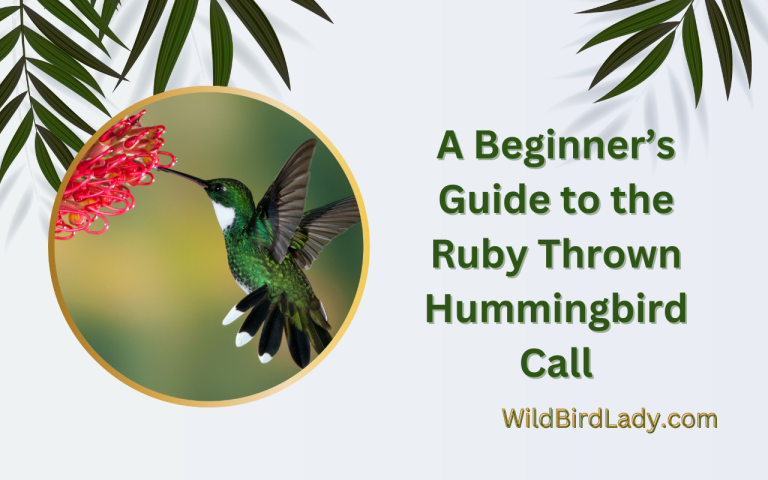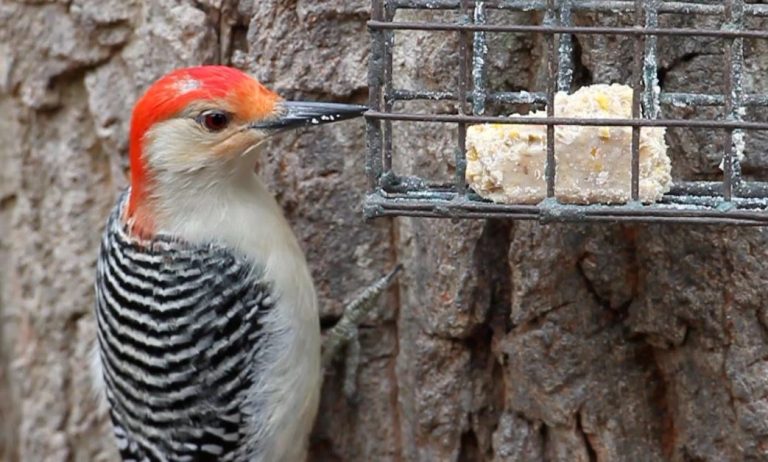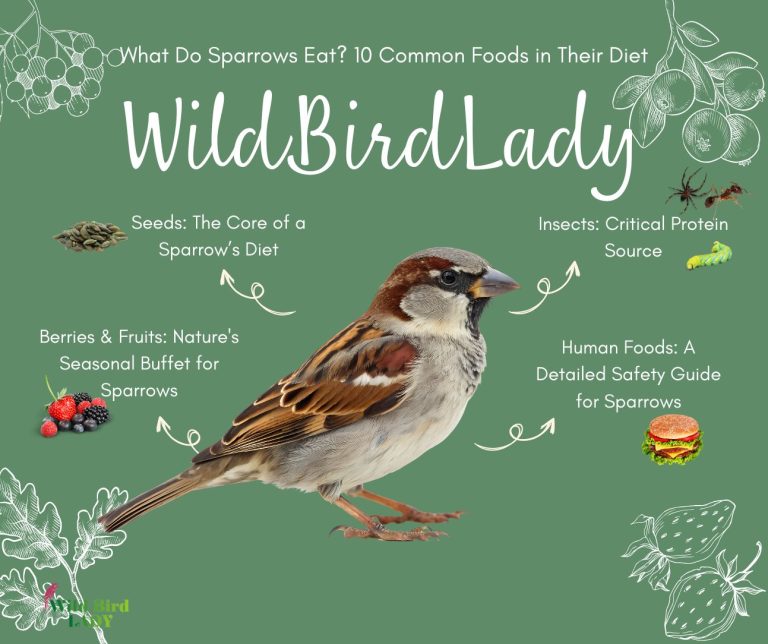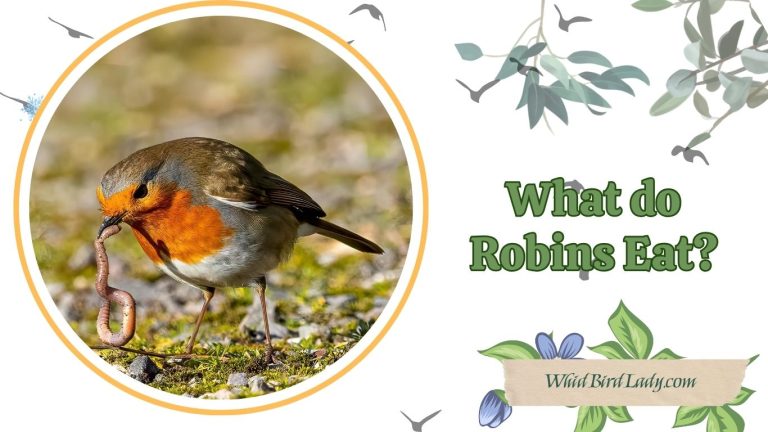Tweet-Proof Your Tomato Garden: How to Stop Birds from Eating Tomatoes
🐦 To stop birds from eating tomatoes, cover the plants with bird netting. Put the netting over the plants before tomatoes start to ripen.
Do you ever feel like you’re in a never-ending battle with birds over your precious tomato harvest? You lovingly tend to your plants, carefully watering, fertilizing, and patiently waiting for those juicy, ripe tomatoes to appear. But just as you’re about to pluck one from the vine, you find it half-eaten, with a mocking feather nearby. It’s enough to drive any gardener to the brink of madness! Fear not, my fellow tomato enthusiasts, because in this article, we’re going to reveal the secrets to keeping those pesky feathered thieves at bay.
Imagine the satisfaction of sinking your teeth into a vine-ripened tomato that you successfully protected from winged invaders. No more sharing your hard-earned harvest with the avian population! Whether you’re a seasoned green thumb or just starting out on your gardening journey, we’ve got you covered with practical tips, ingenious tricks, and maybe even a few hilarious anecdotes along the way. So grab your garden gloves and get ready to outsmart those tomato-loving birds, because we’re about to dive into the ultimate guide on how to stop birds from eating your precious tomatoes. Trust us, you won’t want to miss a single word!
Understanding Bird Behavior
Watching birds devour the tomato fruits you have nurtured and cared for can be frustrating. However, before you jump into any solutions, it’s worth taking some time to understand bird behavior in relation to tomato plants. Here are some of the key points:
- Birds are attracted to tomato plants for a variety of reasons. They may be seeking food, shelter, or a nesting site. Therefore, simply removing the tomatoes might not be enough, as birds may still be attracted to the plants themselves.
Types Of Birds That Are Attracted To Tomato Gardens
Different bird species are attracted to tomato gardens for different reasons. Here are some birds you might see in your garden and why they are attracted to the tomatoes:
- American robin: Robins are omnivorous and will eat both insects and fruits like tomatoes. They are attracted to the bright colors of the fruits and the easy accessibility.
- House sparrow: Sparrows are also omnivorous and will eat both insects and fruits. They are often attracted to tomato plants for the shelter and nesting opportunities.
- Cedar waxwing: These birds are known for their love of fruit, and they particularly enjoy juicy tomatoes. They are often seen in groups, which can make the damage to your plants even worse.
Remember that different bird species may be attracted to your garden depending on your location and the time of year. It’s worth doing some research into the birds in your area to better understand how to protect your tomatoes from their appetites.
Identifying The Problems
How To Tell If Birds Are Eating Your Tomatoes
When you’ve put in hard work to cultivate your tomato plants, it’s a frustrating sight to see birds helping themselves to your fresh tomatoes. But how do you know if the culprit behind missing tomatoes is birds? Here are a few signs that can help you identify if birds are the problem:
- A sudden disappearance of ripe tomatoes: If you notice that your tomatoes started ripening, but suddenly there are no ripe ones left, it could be a sign that birds are eating them.
- Claw prints on the ground: Look out for claw marks in the soil, especially near the tomato plants. Birds usually perch on the plants to have a meal, and their talons may leave marks on the ground.
- Half-eaten tomatoes left behind: If you notice half-eaten tomatoes on the ground near your plants, chances are birds are attacking them.
Other Problems Birds Cause In The Garden
Birds can cause several problems in your garden besides eating your tomatoes. Here are some other issues you might face:
- Nesting in gardens: Birds like to build their nests in gardens, which can damage your plants and sometimes even pose a safety hazard.
- Pecking on fruits and vegetables: Apart from tomatoes, birds can also peck on other fruits and vegetables like strawberries, blueberries, and corn.
- Spreading of seeds: While birds do play a crucial role in seed dispersal, they could also spread seeds to areas where they’re not wanted, leading to the growth of invasive species.
By identifying the problems caused by birds, you can take steps to prevent them from causing damage to your tomato plants.
Natural Deterrents
Covering Tomatoes With Netting Or Mesh
Protecting your tomatoes with netting or mesh is an effective way to deter birds from eating them. These natural barriers are easy to install and can prevent birds from accessing your tomato plants entirely. Here are a few points to keep in mind:
- Use netting or mesh with small holes to prevent birds from getting tangled or trapped.
- Make sure to anchor the netting or mesh securely to prevent birds from entering through the sides.
- Regularly check the netting for any holes or gaps that need patching up.
Creating Visual Barriers With Shiny Objects
Birds are often deterred by shiny objects that create a visual barrier. This is a great natural way to ward off birds from your tomato plants. Here are a few things you can use to create a visual barrier:
- Aluminium foil or reflective tape wrapped around stakes or poles near the tomato plants.
- Old CDs or DVDs hung from strings to create reflective movement.
- Wind chimes or similar items create noise and movement.
Scaring Birds Away With Predator Decoys
Another natural way to prevent birds from eating your tomatoes is by scaring them away. Predator decoys are a great option as birds are often frightened of larger animals. Here are a few things to keep in mind when using predator decoys:
- Move the decoys around regularly to avoid birds getting used to them.
- Make sure that the decoys are placed close enough to the tomato plants to have an impact.
- Consider purchasing a few different decoys to keep things interesting for the birds.
Using Bird-Repellent Sprays Or Homemade Deterrents
Bird-repellent sprays or homemade deterrents made from natural ingredients are a great last resort if nothing else seems to work. Here are some tips for using these sprays or deterrents:
- Always read the product label and follow the instructions carefully.
- Choose sprays or deterrents made from natural ingredients to avoid harming the birds or your tomato plants.
- If making your own deterrents, use ingredients known to repel birds, such as cloves, peppers, or vinegar.
Remember, by using natural deterrents; you’ll be able to protect your tomato plants while being kind to the environment.
Mechanical Deterrents
Installing Motion-Activated Sprinklers
Installing motion-activated sprinklers is an effective way to deter birds from attacking your tomatoes. Here are the key points to keep in mind:
- Motion-activated sprinklers scare away birds by spraying water when they come too close to your tomato plants
- They’re easy to install and require minimal maintenance
- This method is humane and doesn’t harm the birds in any way
- You’ll need to position the sprinklers strategically to make sure they cover the areas where birds are prone to attack
- You can also adjust the sensitivity of the motion sensors to ensure that the sprinklers only activate when birds are present.
Setting Up Bird Repeller Tape Or Balloons
Another effective way to keep birds away from your tomatoes is by using bird repeller tape or balloons. Here’s what you need to know:
- Bird repeller tape is a highly reflective tape that confuses birds and makes them think there is an obstacle in front of them
- Balloons are also effective because they move in the breeze and scare birds away
- You can hang the tape or balloons around your tomato plants to create a barrier that birds can’t penetrate
- This method is non-toxic and eco-friendly, so you don’t have to worry about harming the birds or the environment
Using Bird Spikes Or Wires
Bird spikes or wires are a physical barrier that prevents birds from landing on your tomato plants. Here’s what you need to know:
- Bird spikes are made of plastic or metal and are installed in areas where birds tend to land
- Bird wires are thin, taut wires that are strung across areas where birds tend to land
- Both methods make it difficult for birds to land and walk on your tomato plants
- You need to make sure that the spikes or wires are installed correctly and are sturdy enough to hold the weight of the birds.
- This method is effective and doesn’t harm the birds in any way
Preventative Measures And Best Practices
Planting Companion Plants That Help Protect Tomatoes
One of the best ways to prevent birds from eating your tomatoes is to plant companion plants that can help protect them. Here are some plants that you can consider planting:
- Marigolds: The scent of marigolds repels various insects, including birds. You can plant marigolds around your tomato plants to help keep birds away.
- Nasturtiums: Nasturtiums not only add colour to your garden but also act as a trap crop for aphids. Aphids are attracted to nasturtiums, which helps keep them away from your tomatoes.
- Basil: The aroma of basil repels insects and can be useful in protecting your tomatoes from birds.
Planting these companion plants alongside your tomatoes can help to deter birds from eating them.
Choosing Bird-Resistant Tomato Varieties
Your choice of tomato varieties can also determine whether birds will eat your tomato plants or not. Some tomato varieties are more resistant to bird damage than others. Here are some bird-resistant tomato varieties that you can consider planting:
- Green Zebra: This is a small, tangy tomato variety that birds do not commonly eat.
- Beefsteak: Beefsteak tomatoes are large and juicy, which makes them less attractive to birds.
- San Marzano: San Marzano tomatoes are meaty and flavorful, and birds do not usually eat them.
Choosing bird-resistant tomato varieties can help protect your tomato plants from bird damage.
Properly Maintaining The Garden And Promptly Removing Damaged Or Diseased Tomatoes
Another way to prevent birds from eating tomatoes is to properly maintain the garden and promptly remove any damaged or diseased tomatoes. Here are some best practices to follow:
- Remove any diseased or damaged tomatoes: Tomatoes that are diseased or damaged attract birds. Promptly remove any diseased or damaged tomatoes to prevent birds from flocking to your garden.
- Prune the tomato plants: Pruning your tomato plants can help regulate the growth and spread of the plant. This can help prevent damage caused by birds.
- Use a net: Covering your tomato plants with a net will keep birds from getting to them.
Proper garden maintenance and timely removal of damaged or diseased tomatoes can help prevent birds from eating your tomatoes.
Disposing Of Fallen Fruit And Other Attractants
Birds are attracted to fallen fruit and other garden debris. It’s important to promptly dispose of fallen fruit or other attractants to prevent birds from entering your garden. Here are some tips:
- Remove any fallen fruit: Check your garden regularly for any fallen fruit and dispose of it promptly.
- Keep your garden clean: Clear away any garden debris, such as weeds or dead plants, that could attract birds.
- Cover compost piles: Birds are attracted to compost piles. Covering your compost pile will help keep birds away.
Properly disposing of fallen fruit and keeping your garden clean can help prevent birds from eating your tomatoes.
Frequently Asked Questions
How Do Birds Find Tomatoes?
Birds are attracted to the bright, colorful tomatoes and their smell.
What Are Some Bird Repellent Sprays?
Several options include hot pepper spray, garlic spray, and essential oil sprays, like peppermint or citrus.
How Often Should I Apply Bird Repellent?
You should apply repellent every few days or after it rains to ensure it stays effective in deterring birds.
Final Takeaway
Overall, there are plenty of effective ways to prevent birds from eating your tomatoes. The key is to combine multiple solutions and stay vigilant in your efforts to protect your plants. Whether it’s investing in bird netting or using a homemade repellent spray, taking preventative measures will save you from the frustration of losing your crop to birds.
Additionally, focusing on companion planting and creating a bird-friendly area in your yard can help divert their attention away from your tomatoes and towards a more suitable habitat. With a bit of patience and persistence, you can successfully keep birds from eating your tomatoes and watch your garden flourish.
Happy gardening!

